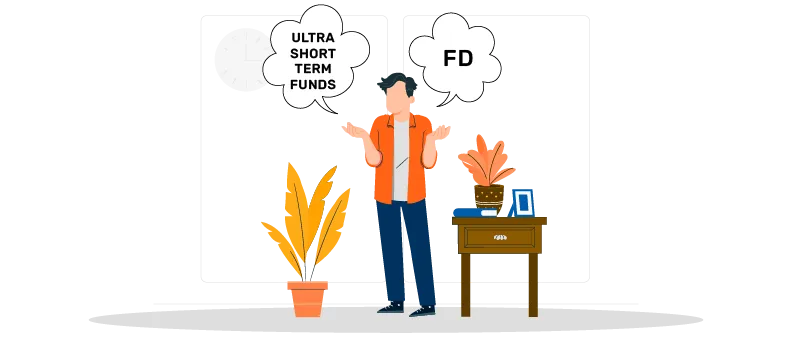Fixed deposits (FDs) are a popular option for those looking to park money in a safe instrument with guaranteed returns. Another investment avenue that offers similar and sometimes potentially higher returns – though without guarantees – is ultra-short-duration funds.
There are some key differences between ultra-short-duration funds vs FDs when it comes to return potential, liquidity, and convenience. This article compares the structure, risks and returns, of FDs and ultra-short-duration funds to help you decide which is better suited for your needs.
- What are fixed deposits?
- What is ultra short-term funds?
- Fixed deposit (FD) vs ultra short duration fund
- Which is better-fixed deposit (FD) vs ultra-short duration fund?
- Who should invest in ultra-short duration funds?
- Why should you invest in ultra-short duration funds?
What are fixed deposits?
Fixed deposits (FDs) are financial instruments offered by banks and financial institutions where you deposit a sum of money for a fixed period at a predetermined interest rate that is typically higher than a regular savings account. FDs are popular among investors seeking relatively stable returns with low risk and are often used for both short-term and long-term financial planning goals.
What are ultra short-term funds?
Ultra short-term funds are a category of mutual funds that primarily invest in debt and money market instruments with very short maturities. These funds are designed for investors looking to park their money for a short duration while seeking slightly higher returns than traditional savings accounts or fixed deposits. Ultra short-term funds are suitable for investors with a short-term investment horizon (typically up to a year) who seek liquidity, stability, and slightly higher returns than traditional savings instruments. They are widely used by both retail and institutional investors for purposes such as emergency funds, short-term goals, or as an alternative to fixed deposits. However, in the case of ultra-short-duration funds, the returns are linked to the market and are not fixed.
Fixed Deposit (FD) vs ultra short duration fund
Fixed Deposits (FDs) and ultra short duration funds are both investment options but differ significantly in terms of structure, risk profile, returns, and liquidity. Here are the key differences between the two:
FDs are deposit accounts offered by banks and non-banking finance companies where you deposit a lumpsum amount for a fixed tenure, which can range from 7 days to 10 years, to earn a predetermined rate of interest over a fixed tenure.
Ultra-short-duration funds are a category of debt mutual funds that invest in short-term fixed-income securities such as treasury bills, certificates of deposit, commercial paper, etc. with a Macaulay duration of between 3-6 months.
FD returns are based on the prevailing interest rates in the economy and the duration of your investment. As of April 2024, 1-year FD rates of major banks are around 6%. The returns are guaranteed, and bank deposits are one of the safest investment avenues.
In comparison, the one-year returns on ultra-short-duration funds are not fixed but have ranged roughly between 3% and 7% in the last five years.
FDs from reputed banks don't carry high risk. Returns are fixed and guaranteed if you hold the FD till maturity. Even if the bank goes bust, deposits up to Rs. 5 lakh (per bank per investor) are insured.
Debt funds, on the other hand, carry market risk linked to the creditworthiness of the debt issuer and interest rate fluctuations. However, ultra-short-duration funds tend to be relatively stable because of the short duration of their underlying securities. Also, credit risk is diversified across several issuers and securities, and fund managers seek to invest in high-quality instruments.
FD tenure can range from 7 days to 10 years. Ultra-short-duration debt funds do not have a fixed tenure but are suitable for investments of a few months to a year.
FDs offer medium liquidity. You can't add or withdraw funds whenever you wish to, and you may incur a penalty if you prematurely break your FD. Debt funds offer relatively high liquidity as you can add funds or redeem units without penalties except in some instances where schemes may have an exit load. This makes them ideal for parking surplus funds for a short period.
Which is better-fixed deposit (FD) vs ultra-short duration fund?
The avenue that is more suitable for you depends on your risk tolerance, investment horizon and liquidity needs. Fixed deposits from reputed financial institutions offer fixed returns and capital stability, making them suitable for risk-averse investors.
Ultra-short duration funds can offer slightly higher return potential in good market conditions but carry risk. However, they offer high liquidity. You can redeem some or all of your units and add more funds whenever needed (barring exit loads, if any).
Who should invest in ultra-short duration funds?
Investors with a short-term investment horizon:* These funds are designed for those who need to invest their money for a brief period, typically ranging from a few weeks to a few months (3 to 12 months). If you have a financial goal within this timeframe, ultra-short duration funds may be an option.
Risk-averse investors: Compared to other debt mutual funds, ultra-short duration funds carry relatively lower risk. They invest in very short-term debt instruments, which are less affected by interest rate fluctuations. If you prioritize capital preservation and have a low-risk tolerance, these funds might be suitable.
Investors looking for slightly better returns than savings accounts: While they do not offer high returns, ultra-short duration funds typically provide slightly better returns than a regular savings account. If you have surplus funds in your savings account and want to earn a little more without taking on significant risk, these funds can be considered.
Investors seeking liquidity: Ultra-short duration funds generally provide high liquidity, making it easy to access your money when needed. This makes them suitable for emergency funds or planned short-term expenses.
Why should you invest in ultra-short duration funds?
Ultra-short duration funds may be suitable for certain investors due to several factors
Short-term parking of funds: If you have a lump sum that you need to set aside for a short period (a few weeks to a year) before using it for a specific purpose—such as a down payment, business expense, or emergency fund—ultra-short duration funds can be a potential alternative to a regular savings account.
Relatively lower risk than other debt funds: These funds invest in very short-term debt instruments, making them less sensitive to interest rate fluctuations than longer-duration debt funds.
Liquidity: Ultra-short duration funds generally provide high liquidity, allowing investors to access their funds when needed.
Diversification: Adding ultra-short duration funds to an investment portfolio can provide some diversification, especially for investors who also hold equity or other types of debt funds.
Conclusion
FDs and ultra-short-duration funds both have their pros and cons. FDs are suitable if you want guaranteed returns and do not need liquidity. Debt funds provide high liquidity but entail risk and may underperform in volatile markets. Assess your investment goals, time horizon, and risk tolerance before deciding between the two. Maintaining a balance between the two in your portfolio can help optimize the stability, return potential, and liquidity. If you are exploring ultra-short-duration funds, consider using a lumpsum mutual fund calculator to estimate the potential size of your final corpus based on your investment amount, tenure and expected returns.
FAQs
What is the ideal tenure for parking funds in ultra-short-duration debt funds?
The ideal investment horizon for ultra-short-duration debt funds is a few months to a year. Given their short portfolio duration, they are better suited for temporary parking of surplus funds or to build a corpus for a near-term goal.
How frequently should one track the performance of ultra-short-duration debt funds?
Checking the performance of an ultra-short-duration fund once every quarter should be sufficient given their relatively low volatility.
Is there any guarantee for returns from ultra-short-duration debt funds?
No, the returns from ultra-short-duration debt funds are not guaranteed and can fluctuate depending on market conditions. However, given their low duration, the fluctuations are typically not very high, making them relatively stable. Online tools such as a daily compound interest calculator can help you assess the potential returns on your investment based on your tenure, invested amount and expected potential returns. Do note, however, that the calculator's estimates are just indicative and there is no assurance that returns will be along expected lines.
Which is safer: Fixed Deposits or Ultra-Short Duration Funds?
Fixed deposits (FDs) generally provide more predictable returns as they offer a fixed interest rate for a specific period. Ultra-short duration funds, though investing in short-term debt instruments, are still subject to some market fluctuations. However, both FDs and ultra-short duration funds involve certain risks.
Can I lose money in ultra-short-duration funds?
Ultra-short duration funds are considered relatively low-risk compared to other debt funds, but losses are not impossible. Factors like credit risk (borrower default) or interest rate fluctuations can negatively impact the fund’s Net Asset Value (NAV). However, the potential for loss in ultra-short duration funds is generally lower than in longer-duration debt funds or equity funds.
How are Fixed Deposits and Ultra-Short Duration Funds taxed?
Interest earned on fixed deposits (FDs) is taxed according to the investor’s applicable income tax slab. Similarly, gains from ultra-short duration funds, regardless of the holding period, are also added to the investor’s income and taxed at the applicable slab rate. As a result, both are currently taxed in a similar manner.
Which option is better for emergency funds: Fixed Deposits or Ultra-Short Duration Funds?
For emergency funds, fixed deposits (FDs) are often chosen due to their predictable returns and relatively easy accessibility. Ultra-short duration funds may offer slightly higher potential returns but are subject to some market fluctuations. For immediate financial needs, the certainty of an FD can be beneficial, though both options carry some level of risk.
Related Searches:
Mutual Fund investments are subject to market risks, read all scheme related documents carefully.
This document should not be treated as endorsement of the views/opinions or as investment advice. This document should not be construed as a research report or a recommendation to buy or sell any security. This document is for information purpose only and should not be construed as a promise on minimum returns or safeguard of capital. This document alone is not sufficient and should not be used for the development or implementation of an investment strategy. The recipient should note and understand that the information provided above may not contain all the material aspects relevant for making an investment decision. Investors are advised to consult their own investment advisor before making any investment decision in light of their risk appetite, investment goals and horizon. This information is subject to change without any prior notice.


